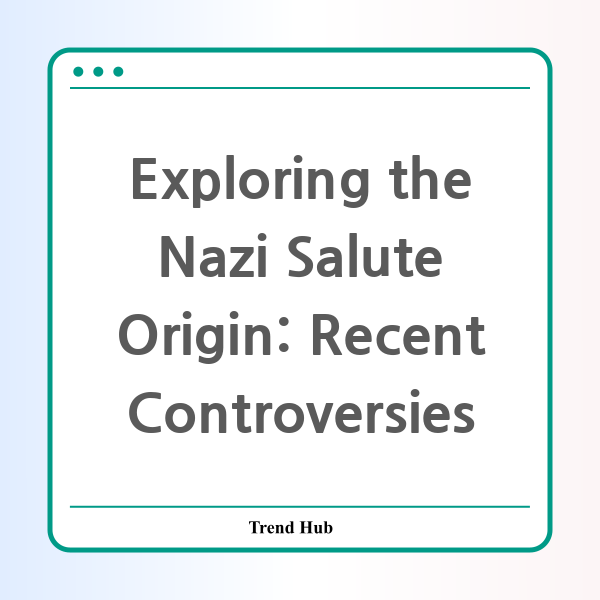* This website participates in the Amazon Affiliate Program and earns from qualifying purchases.

What happens when a gesture ignites a firestorm of controversy? This very question arose recently when Elon Musk performed an arm gesture at a rally in support of Donald Trump, leading many to draw parallels with the infamous Nazi salute. But what exactly is the origin of the Nazi salute, and why does it still evoke such strong feelings today? In this blog post, we will delve into the historical context of the Nazi salute, the reactions surrounding Musk's gesture, and the implications these incidents carry in today’s socio-political landscape.
The Nazi salute, known as the "Sieg Heil" salute, is associated with Adolf Hitler and the Third Reich, symbolizing obedience to the Führer and the Nazi ideology. Its origin is believed to be influenced by the Roman salute, which was used in ancient Rome to honor leaders and express loyalty. However, it was adopted by the Nazis in the 1930s and became a central part of their propaganda. This salute was not merely a gesture but a powerful expression of allegiance to a regime known for its atrocities and extremist ideologies.
Fast forward to the present, Elon Musk’s recent rally performance sparked a debate about intent and interpretation. At the event, Musk made a gesture that many on social media likened to a Nazi salute, causing a significant backlash. Despite Musk's dismissal of the claims, stating that critics needed "better dirty tricks," the discourse surrounding his actions has created ripples across various platforms. Some individuals defended his gesture, claiming it was an awkward expression of enthusiasm. However, this has not alleviated the concerns raised by historians and pundits who emphasize the importance of context in understanding the overtones associated with such gestures.
The Anti-Defamation League (ADL) stepped into the fray, asserting that Musk's gesture seemed more like an awkward moment rather than a deliberate Nazi salute. This sentiment contrasts starkly with the opinions of historians who highlight the gravity of the gesture's historical implications. For them, such comparisons are not only relevant but critical in understanding the nuances of political symbolism within contemporary discourse.
Musk's gesture was further compounded by the reactions of those around him. Andrea Stroppa, a figure linked to Musk who posted a clip of the incident with a caption evoking the Roman Empire, indicates a troubling trend of normalizing gestures that resemble historically loaded symbols. It begs the question: Why do gestures that resemble fascist symbols find acceptance in modern discourse, especially from influential figures like Musk? This normalization calls for careful scrutiny, as it has the potential to embolden extremist factions that advocate for similar ideologies.
As we evaluate the consequences of such gestures, it is essential to draw attention to the societal responsibilities that accompany influential platforms. Elon Musk is not only a tech mogul but also a prominent voice that shapes narratives across various audiences. His connection to right-wing politics and recent endorsements of extremist groups raises alarm bells regarding the potential for his actions to influence public sentiment.
In conclusion, the controversy surrounding Musk’s gesture serves as a contemporary case study on the powerful symbolism of the Nazi salute. While society grapples with the interpretations of gestures and their meanings, it also must confront the underlying implications they carry. As we navigate these complex discourses, understanding the historical context of symbols will be critical in fostering an informed public dialogue. Ultimately, the discussions sparked by these incidents are a reminder of the importance of vigilance against the normalization of extremist ideologies in our society.
* This website participates in the Amazon Affiliate Program and earns from qualifying purchases.